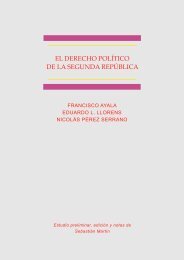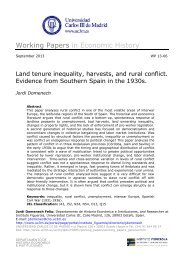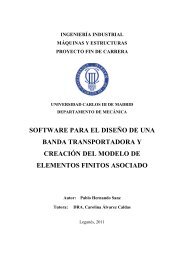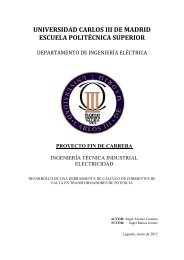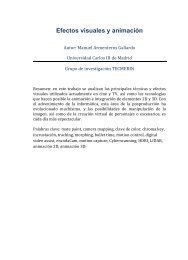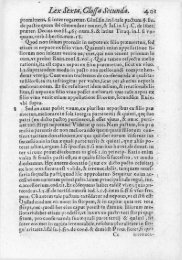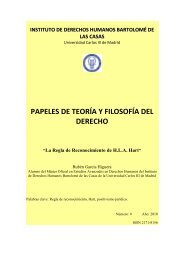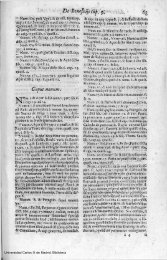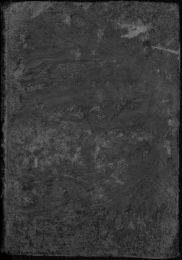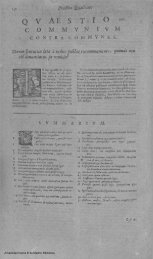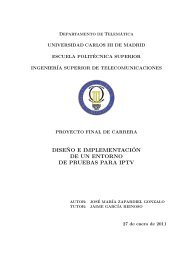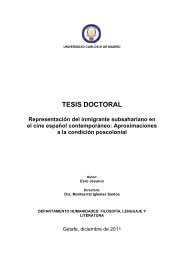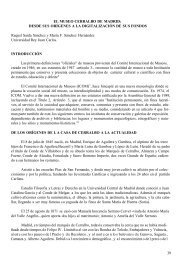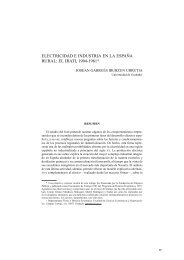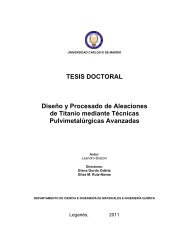- Page 3:
Selected Documents Illustrative of
- Page 6 and 7:
© Universidad Carlos III de Madrid
- Page 9 and 10:
ÍNDICE Do c u m e n t o s
- Page 11:
Documentos
- Page 14 and 15:
LUIS GRAU RESOLVES OF ThE CONVENTIO
- Page 16 and 17:
LUIS GRAU beyond its ancient limits
- Page 19 and 20:
DECLARACIóN DE DEREChOS DEL CONGRE
- Page 21 and 22: DECLARACIÓN DE DERECHOS DEL CONGRE
- Page 23 and 24: DECLARACIÓN DE DERECHOS DEL CONGRE
- Page 25 and 26: DECLARACIÓN DE DERECHOS DEL CONGRE
- Page 27 and 28: DECLARACIÓN DE DERECHOS DEL CONGRE
- Page 29 and 30: DECLARACIÓN DE DERECHOS DEL CONGRE
- Page 31: DECLARACIÓN DE DERECHOS DEL CONGRE
- Page 34 and 35: LUIS GRAU ThE MECkLENBURGh RESOLUTI
- Page 36 and 37: LUIS GRAU he acting conformably to
- Page 39 and 40: CONSTITUCIóN DE NUEVA hAMPShIRE DE
- Page 41 and 42: CONSTITUCIÓN DE NUEVA HAMPSHIRE 17
- Page 43 and 44: CONSTITUCIÓN DE NUEVA HAMPSHIRE 17
- Page 45: CONSTITUCIÓN DE NUEVA HAMPSHIRE 17
- Page 48 and 49: LUIS GRAU ThE CONSTITUTION OF SOUTh
- Page 50 and 51: LUIS GRAU overawe and subdue the co
- Page 52 and 53: LUIS GRAU freedom to servants and s
- Page 54 and 55: LUIS GRAU deliberated touching the
- Page 56 and 57: LUIS GRAU having passed the general
- Page 58 and 59: LUIS GRAU the district to the eastw
- Page 60 and 61: LUIS GRAU chosen by the General Ass
- Page 62 and 63: LUIS GRAU and commissioned by the P
- Page 64 and 65: LUIS GRAU XXXII. That all persons n
- Page 67 and 68: DECLARACIóN DE DEREChOS DE VIRGINI
- Page 69 and 70: Sello del Estado de Virginia
- Page 71: DECLARACIÓN DE DERECHOS DE VIRGINI
- Page 76 and 77: LUIS GRAU The Constitution or Form
- Page 78 and 79: LUIS GRAU of his negative, he hath
- Page 80 and 81: LUIS GRAU VI. The other shall be ca
- Page 82 and 83: LUIS GRAU State, have the power of
- Page 84 and 85: LUIS GRAU ordering a court-martial,
- Page 86 and 87: LUIS GRAU or subjected to such pain
- Page 88 and 89: LUIS GRAU of the Indian natives but
- Page 91 and 92: CONSTITUCIóN DE NUEVA JERSEY Docum
- Page 93 and 94: CONSTITUCIÓN DE NUEVA JERSEY 1776
- Page 95 and 96: CONSTITUCIÓN DE NUEVA JERSEY 1776
- Page 97 and 98: CONSTITUCIÓN DE NUEVA JERSEY 1776
- Page 99 and 100: CONSTITUCIÓN DE NUEVA JERSEY 1776
- Page 101 and 102: CONSTITUCIÓN DE NUEVA JERSEY 1776
- Page 103: CONSTITUCIÓN DE NUEVA JERSEY 1776
- Page 106: LUIS GRAU Unidas son, y por derecho
- Page 109 and 110: DECLARACIÓN DE INDEPENDENCIA 1776
- Page 111 and 112: DECLARACIÓN DE INDEPENDENCIA 1776
- Page 113 and 114: DECLARACIÓN DE INDEPENDENCIA 1776
- Page 115: DECLARACIÓN DE INDEPENDENCIA 1776
- Page 118: LUIS GRAU ban continuamente a sus r
- Page 121 and 122: DECLARACIÓN DE DERECHOS DEL DELAWA
- Page 123 and 124:
DECLARACIÓN DE DERECHOS DEL DELAWA
- Page 125:
DECLARACIÓN DE DERECHOS DEL DELAWA
- Page 128 and 129:
LUIS GRAU ThE CONSTITUTION, OR SYST
- Page 130 and 131:
LUIS GRAU settle its own rules of p
- Page 132 and 133:
LUIS GRAU VIII. A Privy-council con
- Page 134 and 135:
LUIS GRAU on the ballot, the Presid
- Page 136 and 137:
LUIS GRAU Governor heretofore enjoy
- Page 138 and 139:
LUIS GRAU in their stead, until the
- Page 140 and 141:
LUIS GRAU and the Declaration of Ri
- Page 142 and 143:
LUIS GRAU other State, be suffered
- Page 145 and 146:
CONSTITUCIóN DE PENNSYLVANIA Docum
- Page 147 and 148:
CONSTITUCIÓN DE PENNSYLVANIA 1776
- Page 149 and 150:
CONSTITUCIÓN DE PENNSYLVANIA 1776
- Page 151 and 152:
CONSTITUCIÓN DE PENNSYLVANIA 1776
- Page 153 and 154:
CONSTITUCIÓN DE PENNSYLVANIA 1776
- Page 155 and 156:
CONSTITUCIÓN DE PENNSYLVANIA 1776
- Page 157 and 158:
CONSTITUCIÓN DE PENNSYLVANIA 1776
- Page 159 and 160:
CONSTITUCIÓN DE PENNSYLVANIA 1776
- Page 161 and 162:
CONSTITUCIÓN DE PENNSYLVANIA 1776
- Page 163 and 164:
CONSTITUCIÓN DE PENNSYLVANIA 1776
- Page 165 and 166:
CONSTITUCIÓN DE PENNSYLVANIA 1776
- Page 167 and 168:
CONSTITUCIÓN DE PENNSYLVANIA 1776
- Page 169 and 170:
CONSTITUCIÓN DE PENNSYLVANIA 1776
- Page 171 and 172:
CONSTITUCIÓN DE PENNSYLVANIA 1776
- Page 173:
CONSTITUCIÓN DE PENNSYLVANIA 1776
- Page 176 and 177:
LUIS GRAU A Declaration of Rights,
- Page 178 and 179:
LUIS GRAU manifestly endangered, an
- Page 180 and 181:
LUIS GRAU incompatible with liberty
- Page 182 and 183:
LUIS GRAU or kept up without consen
- Page 184 and 185:
LUIS GRAU of the christian religion
- Page 186 and 187:
LUIS GRAU dunkers, 15 and those cal
- Page 188 and 189:
LUIS GRAU Th e ConsTiTuTion A n D f
- Page 190 and 191:
LUIS GRAU but the inhabitants of th
- Page 192 and 193:
LUIS GRAU course of law; they may e
- Page 194 and 195:
LUIS GRAU 13. That the treasurers (
- Page 196 and 197:
LUIS GRAU 16. That the senators sha
- Page 198 and 199:
LUIS GRAU 20. That not less than a
- Page 200 and 201:
LUIS GRAU house of delegates, when
- Page 202 and 203:
LUIS GRAU 32. That upon the death,
- Page 204 and 205:
LUIS GRAU practised in this state.
- Page 206 and 207:
LUIS GRAU or removal out of the cou
- Page 208 and 209:
LUIS GRAU 43. That every person who
- Page 210 and 211:
LUIS GRAU officer though not re-app
- Page 212 and 213:
LUIS GRAU offices, or to any office
- Page 214 and 215:
LUIS GRAU confirmation thereof at l
- Page 216 and 217:
LUIS GRAU That Abraham Barnes, hugh
- Page 218 and 219:
LUIS GRAU Worcester county. That th
- Page 221 and 222:
CONSTITUCIóN DE CAROLINA DEL NORTE
- Page 223 and 224:
CONSTITUCIÓN DE CAROLINA DEL NORTE
- Page 225 and 226:
CONSTITUCIÓN DE CAROLINA DEL NORTE
- Page 227 and 228:
CONSTITUCIÓN DE CAROLINA DEL NORTE
- Page 229 and 230:
CONSTITUCIÓN DE CAROLINA DEL NORTE
- Page 231 and 232:
CONSTITUCIÓN DE CAROLINA DEL NORTE
- Page 233 and 234:
CONSTITUCIÓN DE CAROLINA DEL NORTE
- Page 235 and 236:
CONSTITUCIÓN DE CAROLINA DEL NORTE
- Page 237 and 238:
CONSTITUCIÓN DE CAROLINA DEL NORTE
- Page 239 and 240:
CONSTITUCIÓN DE CAROLINA DEL NORTE
- Page 241:
CONSTITUCIÓN DE CAROLINA DEL NORTE
- Page 244 and 245:
LUIS GRAU The Constitution of the S
- Page 246 and 247:
LUIS GRAU On the first day of the m
- Page 248 and 249:
LUIS GRAU and also they, and all ot
- Page 250 and 251:
LUIS GRAU X. No officer whatever sh
- Page 252 and 253:
LUIS GRAU the same to the best of m
- Page 254 and 255:
LUIS GRAU offered to them by the ho
- Page 256 and 257:
LUIS GRAU sent to the Council shall
- Page 258 and 259:
LUIS GRAU county of Chatham. The se
- Page 260 and 261:
LUIS GRAU XLI. The jury shall be ju
- Page 262 and 263:
LUIS GRAU in the reign of Charles t
- Page 264 and 265:
LUIS GRAU a majority of the countie
- Page 267 and 268:
CONSTITUCIóN DE NUEVA YORk Documen
- Page 269 and 270:
CONSTITUCIÓN DE NUEVA YORK DE 1777
- Page 271 and 272:
CONSTITUCIÓN DE NUEVA YORK DE 1777
- Page 273 and 274:
CONSTITUCIÓN DE NUEVA YORK DE 1777
- Page 275 and 276:
CONSTITUCIÓN DE NUEVA YORK DE 1777
- Page 277 and 278:
CONSTITUCIÓN DE NUEVA YORK DE 1777
- Page 279 and 280:
CONSTITUCIÓN DE NUEVA YORK DE 1777
- Page 281 and 282:
CONSTITUCIÓN DE NUEVA YORK DE 1777
- Page 283 and 284:
CONSTITUCIÓN DE NUEVA YORK DE 1777
- Page 285 and 286:
CONSTITUCIÓN DE NUEVA YORK DE 1777
- Page 287 and 288:
CONSTITUCIÓN DE NUEVA YORK DE 1777
- Page 289 and 290:
CONSTITUCIÓN DE NUEVA YORK DE 1777
- Page 291 and 292:
CONSTITUCIÓN DE NUEVA YORK DE 1777
- Page 293 and 294:
CONSTITUCIÓN DE NUEVA YORK DE 1777
- Page 295 and 296:
CONSTITUCIÓN DE NUEVA YORK DE 1777
- Page 297 and 298:
CONSTITUCIÓN DE NUEVA YORK DE 1777
- Page 299 and 300:
CONSTITUCIÓN DE NUEVA YORK DE 1777
- Page 301:
CONSTITUCIÓN DE NUEVA YORK DE 1777
- Page 304:
LUIS GRAU ción de hechos consumado
- Page 307 and 308:
CONSTITUCIÓN DE VERMONT 1777 Const
- Page 309 and 310:
CONSTITUCIÓN DE VERMONT 1777 la se
- Page 311 and 312:
CONSTITUCIÓN DE VERMONT 1777 Dos v
- Page 313 and 314:
CONSTITUCIÓN DE VERMONT 1777 Comun
- Page 315 and 316:
CONSTITUCIÓN DE VERMONT 1777 son s
- Page 317 and 318:
CONSTITUCIÓN DE VERMONT 1777 XII.
- Page 319 and 320:
CONSTITUCIÓN DE VERMONT 1777 Secci
- Page 321 and 322:
CONSTITUCIÓN DE VERMONT 1777 Podr
- Page 323 and 324:
CONSTITUCIÓN DE VERMONT 1777 Secci
- Page 325 and 326:
CONSTITUCIÓN DE VERMONT 1777 Secci
- Page 327 and 328:
CONSTITUCIÓN DE VERMONT 1777 Secci
- Page 329 and 330:
CONSTITUCIÓN DE VERMONT 1777 proce
- Page 331 and 332:
CONSTITUCIÓN DE VERMONT 1777 Secci
- Page 333 and 334:
CONSTITUCIÓN DE VERMONT 1777 Secci
- Page 335 and 336:
CONSTITUCIÓN DE VERMONT 1777 Secci
- Page 337:
CONSTITUCIÓN DE VERMONT 1777 mante
- Page 340 and 341:
LUIS GRAU ThE CONSTITUTION OF SOUTh
- Page 342 and 343:
LUIS GRAU the house of representati
- Page 344 and 345:
LUIS GRAU expiration of one year, f
- Page 346 and 347:
LUIS GRAU except the parishes of Pr
- Page 348 and 349:
LUIS GRAU parish of Prince George,
- Page 350 and 351:
LUIS GRAU of a settled estate and f
- Page 352 and 353:
LUIS GRAU shall issue writs for fil
- Page 354 and 355:
LUIS GRAU such regulations as the l
- Page 356 and 357:
LUIS GRAU XXIX. That two Commission
- Page 358 and 359:
LUIS GRAU or prohibit the exportati
- Page 360 and 361:
LUIS GRAU society of Christians so
- Page 362 and 363:
LUIS GRAU and fashion his own self
- Page 364 and 365:
LUIS GRAU XLV. That the Senate and
- Page 367 and 368:
ARTíCULOS DE LA CONFEDERACIóN Y U
- Page 369 and 370:
Sello de los Estados Unidos de Amé
- Page 371 and 372:
ARTÍCULOS DE LA CONFEDERACIÓN 177
- Page 373 and 374:
ARTÍCULOS DE LA CONFEDERACIÓN 177
- Page 375 and 376:
ARTÍCULOS DE LA CONFEDERACIÓN 177
- Page 377 and 378:
ARTÍCULOS DE LA CONFEDERACIÓN 177
- Page 379 and 380:
ARTÍCULOS DE LA CONFEDERACIÓN 177
- Page 381 and 382:
ARTÍCULOS DE LA CONFEDERACIÓN 177
- Page 383 and 384:
ARTÍCULOS DE LA CONFEDERACIÓN 177
- Page 385 and 386:
ARTÍCULOS DE LA CONFEDERACIÓN 177
- Page 387:
ARTÍCULOS DE LA CONFEDERACIÓN 177
- Page 390 and 391:
LUIS GRAU T h e CONSTITUTION, o r F
- Page 392 and 393:
LUIS GRAU II. It is the right as we
- Page 394 and 395:
LUIS GRAU IV. The people of this Co
- Page 396 and 397:
LUIS GRAU those to which their cons
- Page 398 and 399:
LUIS GRAU relate to mariners’ wag
- Page 400 and 401:
LUIS GRAU oppressive, and inconsist
- Page 402 and 403:
LUIS GRAU SECTION I. Th e GENERAL C
- Page 404 and 405:
LUIS GRAU and whether the said plea
- Page 406 and 407:
ChAPTER I. SECTION II. SENATE. LUIS
- Page 408 and 409:
LUIS GRAU Senators for the district
- Page 410 and 411:
LUIS GRAU and fourteen days before
- Page 412 and 413:
LUIS GRAU in their offices. But pre
- Page 414 and 415:
LUIS GRAU said town immediately on
- Page 416 and 417:
LUIS GRAU And the Senate and house
- Page 418 and 419:
LUIS GRAU voted for; but, if otherw
- Page 420 and 421:
LUIS GRAU army and navy, and over t
- Page 422 and 423:
LUIS GRAU officers elected. The Maj
- Page 424 and 425:
LUIS GRAU required by him, true and
- Page 426 and 427:
LUIS GRAU or absence from the Commo
- Page 428 and 429:
LUIS GRAU VII. And whereas the elec
- Page 430 and 431:
LUIS GRAU IV. The Judges of Probate
- Page 432 and 433:
LUIS GRAU II. And whereas there hav
- Page 434 and 435:
LUIS GRAU private societies and pub
- Page 436 and 437:
LUIS GRAU Commonwealth; except the
- Page 438 and 439:
LUIS GRAU Sheriff - Register of Pro
- Page 440 and 441:
LUIS GRAU in the courts of law, sha
- Page 442 and 443:
LUIS GRAU The said delegates to be
- Page 445 and 446:
LEY DE ABOLICIóN GRADUAL DE LA ESC
- Page 447 and 448:
LEY DE ABOLICIÓN GRADUAL DE LA ESC
- Page 449 and 450:
LEY DE ABOLICIÓN GRADUAL DE LA ESC
- Page 451 and 452:
LEY DE ABOLICIÓN GRADUAL DE LA ESC
- Page 453 and 454:
LEY DE ABOLICIÓN GRADUAL DE LA ESC
- Page 455 and 456:
LEY DE ABOLICIÓN GRADUAL DE LA ESC
- Page 457:
LEY DE ABOLICIÓN GRADUAL DE LA ESC
- Page 460 and 461:
LUIS GRAU RhODE ISLAND ChARTER, G r
- Page 462 and 463:
LUIS GRAU body of the Narraganset I
- Page 464 and 465:
LUIS GRAU pleased to declare, That
- Page 466 and 467:
LUIS GRAU of the said Company for t
- Page 468 and 469:
LUIS GRAU and authority, from time
- Page 470 and 471:
LUIS GRAU particularly that which r
- Page 472 and 473:
LUIS GRAU the authority, office, an
- Page 474 and 475:
LUIS GRAU that for the more peaceab
- Page 476 and 477:
LUIS GRAU within the bounds and lim
- Page 478 and 479:
LUIS GRAU the encouragement of the
- Page 480 and 481:
LUIS GRAU or returning from thence,
- Page 482 and 483:
LUIS GRAU our heirs and successors,
- Page 485:
INFORME SOBRE LA CONSTITUCIóN DE C
- Page 488 and 489:
LUIS GRAU bajo pena de hacer su ser
- Page 491 and 492:
RESOLUCIONES PARA UN GOBIERNO TERRI
- Page 493 and 494:
Sello de los Estados Unidos de Amé
- Page 495 and 496:
RESOLUCIONES PARA UN GOBIERNO TERRI
- Page 497 and 498:
RESOLUCIONES PARA UN GOBIERNO TERRI
- Page 499 and 500:
RESOLUCIONES PARA UN GOBIERNO TERRI
- Page 501:
RESOLUCIONES PARA UN GOBIERNO TERRI
- Page 504 and 505:
LUIS GRAU A ConsTiTuTion Co n T A i
- Page 506 and 507:
LUIS GRAU several towns, parishes,
- Page 508 and 509:
LUIS GRAU XII. Every member of the
- Page 510 and 511:
LUIS GRAU and upon their report, th
- Page 512 and 513:
LUIS GRAU XXVI. In all cases, and a
- Page 514 and 515:
LUIS GRAU a young one; no pension s
- Page 516 and 517:
LUIS GRAU personal, or mixed; and f
- Page 518 and 519:
LUIS GRAU limits of each district,
- Page 520 and 521:
LUIS GRAU at such places respective
- Page 522 and 523:
LUIS GRAU Th e senate shall appoint
- Page 524 and 525:
LUIS GRAU month of March, and shall
- Page 526 and 527:
LUIS GRAU its deliberations; every
- Page 528 and 529:
LUIS GRAU representatives shall by
- Page 530 and 531:
LUIS GRAU their ships, arms, ammuni
- Page 532 and 533:
LUIS GRAU pursuance of the militia
- Page 534 and 535:
LUIS GRAU Th e qualifications for c
- Page 536 and 537:
LUIS GRAU eA C h branch of the legi
- Page 538 and 539:
LUIS GRAU ENCOURAGEMENT o f LITERAT
- Page 540 and 541:
LUIS GRAU This I do under the pains
- Page 542 and 543:
LUIS GRAU Th e enacting stile in ma
- Page 544 and 545:
LUIS GRAU granted and committed, un
- Page 547 and 548:
CONSTITUCIóN DE VERMONT DE 1786 Do
- Page 549 and 550:
Sello del Estado de Vermont
- Page 551 and 552:
CONSTITUCIÓN DE VERMONT 1786 La Co
- Page 553 and 554:
CONSTITUCIÓN DE VERMONT 1786 IV. R
- Page 555 and 556:
CONSTITUCIÓN DE VERMONT 1786 dedic
- Page 557 and 558:
CONSTITUCIÓN DE VERMONT 1786 esenc
- Page 559 and 560:
CONSTITUCIÓN DE VERMONT 1786 Secci
- Page 561 and 562:
CONSTITUCIÓN DE VERMONT 1786 de di
- Page 563 and 564:
CONSTITUCIÓN DE VERMONT 1786 Secci
- Page 565 and 566:
CONSTITUCIÓN DE VERMONT 1786 a alg
- Page 567 and 568:
CONSTITUCIÓN DE VERMONT 1786 de aq
- Page 569 and 570:
CONSTITUCIÓN DE VERMONT 1786 [Nomb
- Page 571 and 572:
CONSTITUCIÓN DE VERMONT 1786 de re
- Page 573 and 574:
CONSTITUCIÓN DE VERMONT 1786 haya
- Page 575 and 576:
CONSTITUCIÓN DE VERMONT 1786 estad
- Page 577 and 578:
CONSTITUCIÓN DE VERMONT 1786 que v
- Page 579 and 580:
CONSTITUCIÓN DE VERMONT 1786 una p
- Page 581 and 582:
CONSTITUCIÓN DE VERMONT 1786 unive
- Page 583 and 584:
CONSTITUCIÓN DE VERMONT 1786 y si
- Page 585:
CONSTITUCIÓN DE VERMONT 1786 consi
- Page 588 and 589:
LUIS GRAU I. WhEREAS Almighty God h
- Page 590 and 591:
LUIS GRAU that she is the proper an
- Page 593 and 594:
GOBIERNO DE LOS TERRITORIOS DEL NOR
- Page 595 and 596:
GOBIERNO DE LOS TERRITORIOS DEL NOR
- Page 597 and 598:
GOBIERNO DE LOS TERRITORIOS DEL NOR
- Page 599 and 600:
GOBIERNO DE LOS TERRITORIOS DEL NOR
- Page 601 and 602:
GOBIERNO DE LOS TERRITORIOS DEL NOR
- Page 603 and 604:
GOBIERNO DE LOS TERRITORIOS DEL NOR
- Page 605 and 606:
GOBIERNO DE LOS TERRITORIOS DEL NOR
- Page 607:
GOBIERNO DE LOS TERRITORIOS DEL NOR



